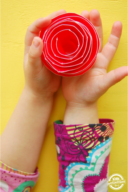I overheard a mom on the playground telling her friend, “
My child is hitting.” This is hard to deal with, I know. If you are dealing with
temper tantrums that get out of control, you are not alone. I think that most parents have to deal with this at some point, but today they are sharing what has worked.
Today we are tackling how to deal with physical aggression from your young children. As a therapist, I found that many times it boils down to something as simple as a lack of communication skills. While that may be the reason, it doesn’t make it OK, so we are going to offer some solutions that work.

My Child Is Hitting: Real Solutions That Work
Give him choices. “Do you want to brush your teeth or put on your PJs first?” Kids become frustrated when they are overwhelmed with too many choices. Giving him choices allows him to have independence and responsibility.
- Check his bedtime. Studies prove that having a consistent bedtime makes a huge impact on their behavior (and their health!).
- Warnings should be used as discipline for incorrect behavior, but not as an alternative to a request. For instance, a child should not be told, “You should brush your teeth or I will take the iPad.”If brushing his teeth is something that must be done but he does not want to brush his teeth then you are giving him a choice between two negatives. He doesn’t want to do either so he will become frustrated because he has no resolution. ~Celeste Johnson
- Make it a two-step process. Step one is to stop the hitting, by putting them in time out (1 minute per year of age). Step two is to offer hugs and talk about it AFTER they have calmed down and come out of time out.
- Are they playing outside enough? I see this behavior a LOT more often in kids that do not have adequate outdoor time to run around and use their energy. They are young and they need to expel that energy. If it isn’t being used in play, it will be used some other way.
- Stimulate their minds. Read books, work on puzzles… eliminate boredom. Play a game that you used to play as a child!
- Many people choose distraction for bad behavior, and while I think it works well for very young children, it may not be enough for an older preschool-aged child. You may have to give a consequence to say “It is unacceptable to hit anyone. If you do, you lose TV time for the afternoon.”
- Even if he can communicate, his nervous system is still developing. His ability to regulate emotion just may not be there yet. It sounds like you’re using a great approach. We say “it’s ok to be mad but it’s motor to hurt.” Or “I see you’re feeling frustrated. If you need to hit, you can hit _____ ”
And most importantly “take a moment if you need. Mommy is here if you want a hug or some help” ~Laura Moriz
- Try not to rush him. Kids can feel stressed when they are rushed or in a hurry. They can become more difficult and lash out.
- Talk about it. “Hands are not for hitting. Hands are for playing, digging, making cookies, petting dogs…”
- Mirror how they feel. One key point that we have read over & over again is to mirror how they feel by saying, “I can see you are upset/angry/hungry” etc but……then address the correct behavior.
- Very young children have to be guided so give them 2 choices: “You can brush your teeth or you can go right to bed without a story tonight.”
- Count to 3, while waiting 5 seconds between each count. Let your child know if you get to 3 it will be bed without a story so they are clear of your expectations. ~Catherine Haigh

- Don’t lose YOUR temper. Stay calm and say “I am not going to let you hit me. I will _____ (hold you, put you in timeout, hug you) until you are calm and then we will talk.” If you lose your temper, it will only escalate things.
- Ignore the tantrums and yelling. The more upset that you, as the adult, becomes, the worse their behavior will become.
- Be a bit dramatic when he hits you. Maybe seeing YOU hurt or upset will be just what you need to show him that it really DOES hurt when he does these things.
- When you see your child starting to get upset, jump in. Don’t let it escalate to hitting.
- My son is 3, and does this. Lately, I’ve been talking with him about if he is upset, we don’t hit, we say “I’m mad and I need a break.” You could also try the “Uh Oh” thing.
Anytime the child does something disrespectful, there is no warning, you take them directly to a designated time out area. If they get up or throw a tantrum, time out starts over. Give affection afterward, but stay consistent. ~Kari Dorencamp
- Say “It is not ok for you to hurt me because you don’t want to …… I am going to go out of the room and you are to stay here until I know I’m safe to come back in and help you” then get up and walk out. ~Allison Lee
- Give warnings: “In 5 minutes, we are going to clean up and come inside to eat lunch.” Just that mental preparation is helpful to children.
- When they start hitting, you can hold them away at arm’s length so they cant hit and kick and say NO! in a voice that is stern, in simple words that they will understand.
- Be consistent! It will not go away after a few attempts, but with consistency, it will resolve.
- Watch what they are eating. A few foods that don’t agree with them and they may react poorly or aggressively. One mom in our Facebook group said that her child was allergic to salicylates that are in food coloring and preservatives.
- Offer a pillow to punch or hit or jump onto to, as a way to get their aggression out.
- Reduce screentime. Studies prove that screentime impacts behavior!
Usually, these things pass (I promise… almost all our challenges things are just phases). We will look back on them and realize that while it was hard, we got through it.
Just encourage yourself and others to be strong and keep on keepin’ on and the
behavior problems will slow and come to an end.
If you are interested in helping others or reading more like this, stop by
our Facebook page, where we talk about parenting topics and so much more!
























0